Tell me and I forget, teach me and I may remember, involve me and I learn; The beautiful thing about learning is that it can never exhaust the mind, and nobody can take it away from you.
Did you know 8 out of 10 businesses in Kenya are informal? By informal businesses I mean spaza shops, hawkers, pavement vendors and street vendors, and Laundromats and other small businesses even from a person’s home.
I believe, like me, you know of your trusted Mama Mboga down the street, but you didn’t really know such a biashara is regarded to as an informal business, or that it makes up about 85% of Kenya’s business sector.
Even more interesting, these informal businesses make up MSMEs… Yet again we’ve heard the term on so many occurrences. How many genuinely know what MSMEs stands for?
MSMEs are Micro, Small and Medium Enterprises.
I wouldn’t have learnt more about the terms if I hadn’t attended USAID Kenya Investment Mechanism’s Learning Event held on 19th and 20th July at Movenpick, Westlands.
Again, learning can never exhaust the mind.
The Kenya Investment Mechanism (KIM) is a five-year USAID project that is facilitating $520 million in investment for key sectors of Kenya’s economy, including agriculture (which is supported by Feed the Future), health; water, sanitation, and hygiene (WASH); clean energy (supported by PowerAfrica) and infrastructure; women-owned businesses; and regional trade and investment opportunities under the Prosper Africa initiative.
The project supports mobilization of private investment and accelerates enterprise-driven development.
Kenya Investment Mechanism addresses two principal market failures that discourage investors from financing Micro, Small and Medium enterprises (MSMEs); insufficient quality consulting services and limited availability of financial products tailored to these sectors.
It builds the capacity of Financial Institutions (FIs) and Business Advisory Service Providers (BASPs) through training and technical assistance. Much of Kenya Investment Mechanism’s focus is on the agricultural sector, which contributes one-third of Kenya’s GDP and accounts for nearly 70% of Kenya’s employment.
Anyway, let’s delve further into the event.
Shall we?
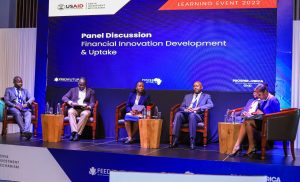
Anthony Mbithi Head of agribusiness Family Bank, Peter Ndirangu- Head of finance FACTS, Anne Mwenje Financial Institutions’ Director KIM, David Njiru CBO Juhudi Kilimo, Antone Wambura Product Development Expert, Nina Shaban Discussion Moderator
All About the Kenya Investment Mechanism Learning Event
The event themed ‘Access & Impact: Transforming Financial Markets for shared prosperity’, brought together Business Advisory Service Providers, Financial Institutions, business executives, international investors, senior government officials and multilateral stakeholders to share, connect and learn from each other.
The two-day event convened financial stakeholders who discussed nuances in promoting access to finance and investments for SMEs and agribusinesses in Kenya and across the region. It also promoted cross-learning on solutions and best practices in mobilizing capital and investment for Kenyan SMEs and the agriculture sector.
Day One: Speaking at the Learning Event’s official opening, was a man whose eloquence, energy and ability to lighten up the audience had me captivated. Hon. David Osiany, Chief Administrative Secretary, CAS, Ministry of Industrialization, Trade & Enterprise Development lauded Kenya Investment Mechanism program’s journey of unlocking capital for local entrepreneurs.
“The Kenya Investment Mechanism program excites me. To focus on agriculture is inspiring, and I’m elated at this program’s journey of unlocking capital for our local entrepreneurs and providing quality consulting services that have previously been a gap for our business people. I look forward to us exploring opportunities that will benefit our business people while also meeting the interests of the American people. Only then can we speak about shared prosperity.”
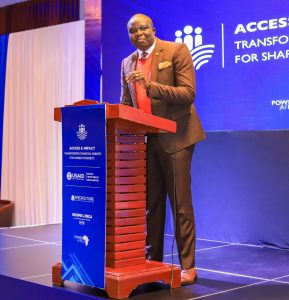
Hon. David Osiany CAS Ministry of Industrialization, Trade & Enterprise Development
During the panel discussion on ‘Financial Innovation Development & Uptake’, I learnt that MSMEs tend to collapse because;
- One, on most occasions MSMEs don’t have the proper documents and records relating to their business, as compared to formal companies.
- Two, MSME owners have the tendency to open up new businesses every time another fails. If you take a moment to particularly reflect on this, you realize how true this fact is.
- Three, Lack of professionalism. Think about the local kiosk at your place. Who’s been ‘employed’ to work there? A family member to the owner in most cases, yes? MSMEs tend to employ on basis of family more than how skilled or experienced the person actually is in that particular field.
- Business Strategies and Seasonalities. Seasonality affects a number of MSMEs. For a farmer some products can only thrive on specific months in a year. For someone selling umbrellas or success cards, these businesses have specific seasons when business is booming. MSMEs need to come up with business strategies that deal with the on-season and off-season for the business.
These issues in turn, put off even Financial Advisors and Institutions from investing in the MSME.
According to Anthony Mbithi, Head Agribusiness Segment, Family Bank, Kenya Investment Mechanism looks at both sides; the financial institutions and SMEs. He also advised MSME owners to involve financial institutions at every step of the way.
“SMEs require much more than financing, which isn’t necessarily needed immediately. There are so many important issues SMEs need to deal with immediately. Coming to your financial institution at the last minute won’t help you, the bank will still need to follow its protocol. You need to prepare your bank about what to expect, especially in the case of seasonality. Financing and receiving financial support depends so much on how you work and relate with your bank.”
The number one challenge faced by women-owned SMEs (W-SMEs) in Kenya is access to credit.
In a discussion dubbed ‘Unlocking Capital for Women Entrepreneurs’, USAID’s Kenya Investment Mechanism convened a panel made up of financial institutions, business advisory service providers, and women entrepreneurs to have a conversation exploring the challenges and opportunities in unlocking capital for W-SMEs.
Through its partnership model, Kenya Investment Mechanism has partnered with BASPs to help W-SMEs become investment ready and package deals that will attract investment. Kenya Investment Mechanism also partners with financial institutions to develop tailor-made financial solutions for W-SMEs. As a result, Kenya Investment Mechanism has mobilized more than $57.3 million for W-SMEs to develop.
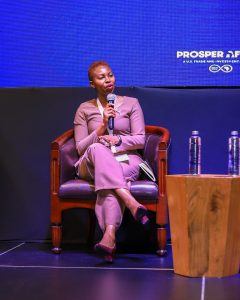
Charity Ndegwa, Co-founder & Director Operations
Exotic EPZ during panel discussion on unlocking capital for women entrepreneurs
Day Two: Out of the 47 counties in Kenya, 29 have an enabling enterprise. This means you can thrive in these counties. The 29 make up the blue savannah and boast of some of the most valuable features and aspects of our country.
Is what I learnt from Tendai Mtana’s, CEC Agriculture, Livestock, Fisheries, and Co-operatives – County Government of Mombasa, Keynote speech on Leveraging incentive fees model for governments to do business with the private sector.
Discussions revolved around the Private sector’s perspective on investment landscape in Kenya, leveraging incentive fees for governments to do business with the private sector and investing in Kenya’s aquaculture sector.
“The state is an important enabler, and has the responsibility to create an enabling environment that allows businesses – both large and MSMEs – to thrive and maximize the comparative advantages our local industries have.”
Wangari Muikia of the EGCL Institute, giving a keynote address on the private sector’s perspective of Kenya’s investment landscape.
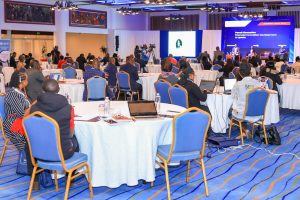
The Kenya Investment Mechanism Learning Event
Many Kenyan SMEs don’t know that the capital markets are an available source of funding. A panel of capital markets experts demystified the capital markets and explained how local SMEs can tap into them to raise significant capital for growth and expansion.
USAID’s Kenya Investment Mechanism has however supported the Capital Markets Authority (CMA) to revise regulations that will simplify the listing process and offer Kenyan SMEs an important alternative source of financing.
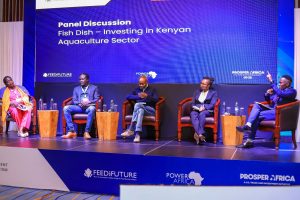
Phoebe Owuor CEO Lamiro Consult, Dave Oketch Aquarech, Samuel Ondiek DAS Group, Edna Odallo MD Afriscope Ltd, Noah Kipkemboi Discussion Moderator
Aquaculture contributes to 17% of fish creation in Africa, and Kenya ranks as the fourth biggest producer of cultivated fish in Africa, producing 100,000 metric Tonnes of fish annually.
Kenya’s fish consumption is at 400,000 metric Tonnes annually, leaving a deficit of 300,000 metric tonnes.
The final panel discussion at the USAID Kenya Investment Mechanism Learning Event focused on the aquaculture sector, investment opportunities along the value chain, and how the use of technology can make the sector more productive and profitable.
Even with recent advancements, the Kenyan aquaculture industry requires substantial additional investment to catch up to global and regional leaders, China and Egypt. Fish farmers, marketers and other ecosystem actors face myriad challenges to growing and developing the sector to realize its potential.
These issues include; low awareness and poor understanding of the sector, the unstructured nature of the relatively new sector, and high taxes on aquaculture inputs.
Working with BASPs such as Afriscope, Kenya Investment Mechanism has mobilized capital from FIs for SME players in the industry responding to different needs in the aquaculture sector.
My Take
Adulting is mostly about trial and error. Every day, the youth are setting up businesses as side hustles, especially on online platforms. Today one is selling, say clothes online, a different person is a phone technician somewhere.
They, well we since I’m part of the age-gap, need to learn early on matters money and financing, how to run and manage these side hustles so that they serve us in the long run, how to join Capital markets. Rather than go through life in a trial-and-error manner.
I would really love to see a higher young persons and youth involvement in future Kenya Investment Mechanism’s Learning Events.
Other than that, boy do I feel wiser on matters capital markets, MSMEs, Agribusiness Financing and more. Learning, yeah?
Thank you for your time.
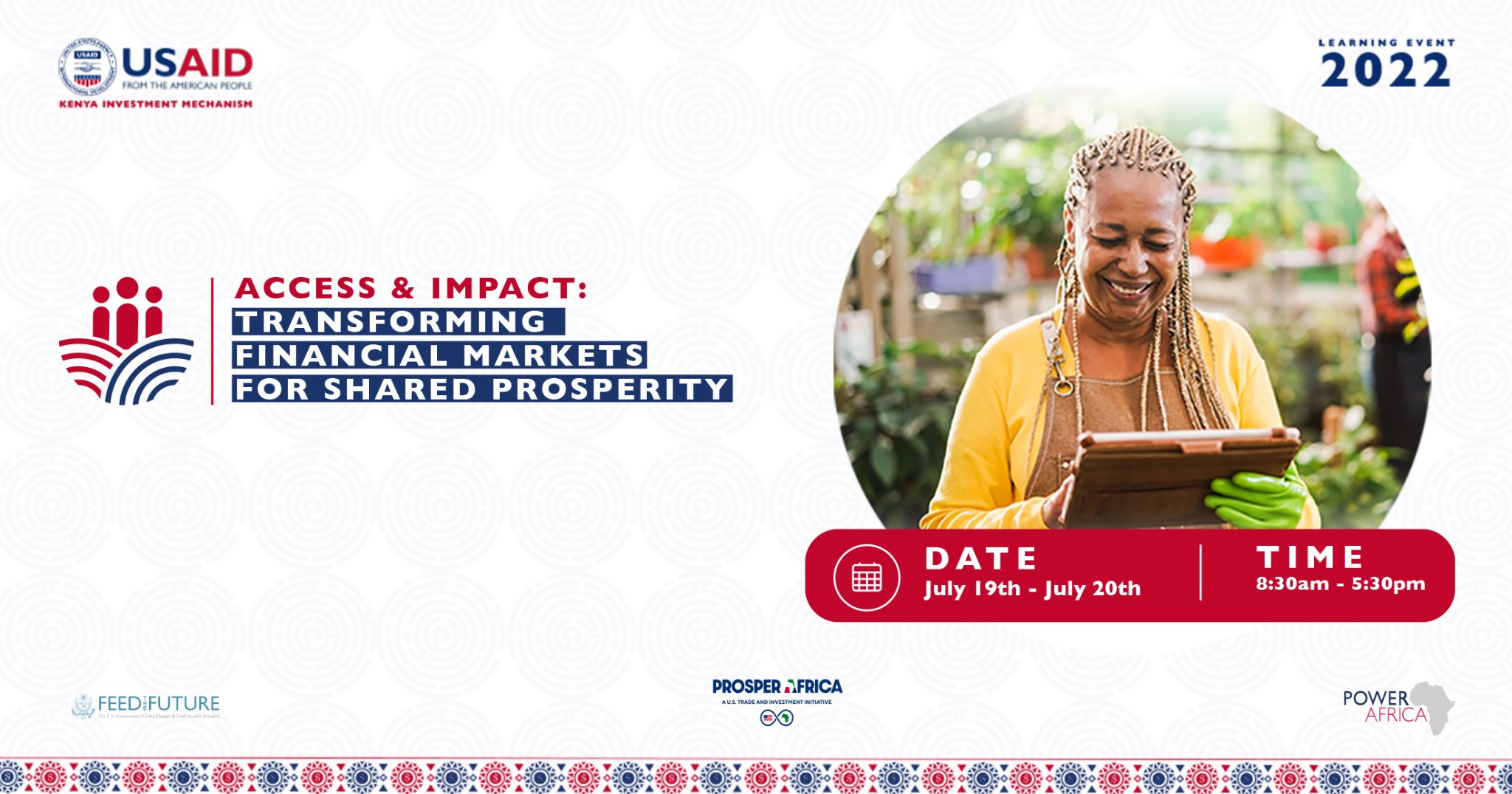

1 comment
This is a very nice article. I have learnt as if I was in the event!. Super!